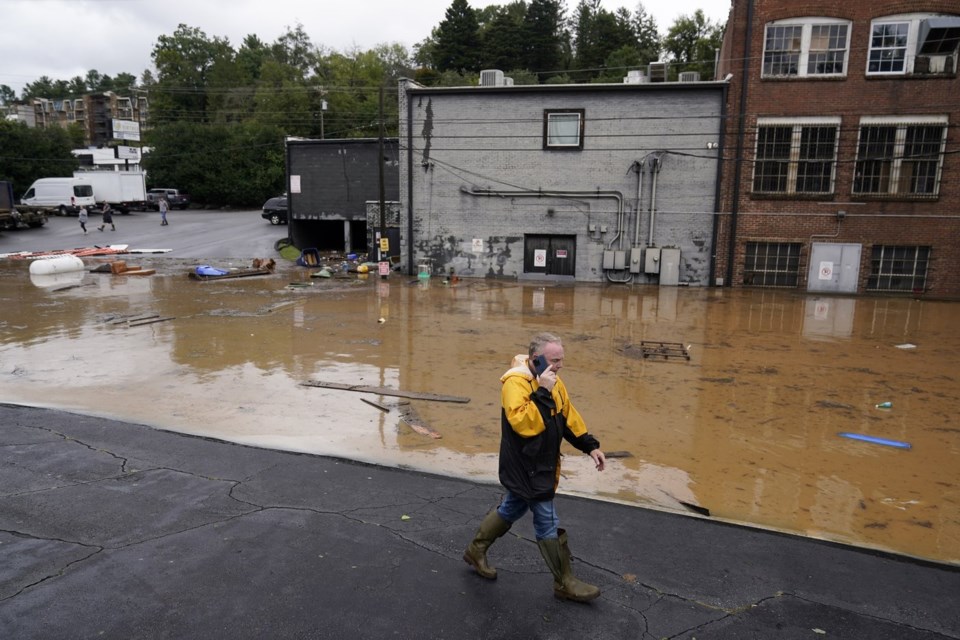CHARLESTON, W.Va. (AP) — After Hurricane Helene devastated Asheville, North Carolina, the sound coming from open car windows as residents gathered on a street at the top of a ridge trying to get cell service last fall was Blue Ridge Public Radio. And as they stood in line for water or food, the latest news they had heard on the station was a frequent topic of conversation.
“The public radio station was alerting people what was going on,” said Lisa Savage, who volunteered at an area church after the hurricane.
Now public radio stations are being targeted for cuts by President Donald Trump. This week, he aimed at slashing public subsidies to NPR and PBS, alleging “bias” in the broadcasters’ reporting.
Public radio stations have been a lifeline for residents during natural disasters that take out power, the internet and cell towers. And in many remote and rural areas across the U.S., they can be a lone source of local news.
About a week after she had volunteered in the Asheville area, Savage recalled driving through another hard-hit community and hearing updates on Blue Ridge Public Radio on where residents could pick up water.
"So that was crucial,” Savage said.
In the West Texas desert, Marfa Public Radio provides listeners with a mix of local and national news and music. It is based in Marfa, a city of about 2,000 that draws tourists to its art scene.
“Marfa Public Radio is the only radio service in a lot of the geographic area that we cover,” said Tom Livingston, the station’s interim executive director. “So it’s really essential in terms of if there’s news events, if there’s safety things that happen in the community.”
Funding has widespread impact
Trump's order instructs the Corporation for Public Broadcasting and other federal agencies “to cease Federal funding for NPR and PBS” and further requires that they work to root out indirect sources of public financing for the news organizations. The broadcasters in public money through the private CPB, which has said that it is not a federal executive agency subject to Trump’s orders.
all suggested Friday that the order was illegal, and a court fight seems inevitable.
The White House has also said it will be asking Congress to for the CPB as part of a $9.1 billion package of cuts. Local stations operate on a combination of government funding, donations and philanthropic grants, and stations in smaller markets are particularly dependent on the public money.
WMMT, based in the eastern Kentucky community of Whitesburg, can be heard in parts of five Appalachian states. The station’s general manager, Teddy Wimer, said listeners “want to hear people that sound like folks that they know from Appalachia,” and the station, which currently operates from a renovated Winnebago called the Possum Den, relies on CPB funding.
“We’re in an economically disadvantaged area of the country,” Wimer said. “Most of our listeners who really rely upon our programming don’t have the funds to ramp up their support.”
Livingston said about 30% of their funding comes from the CPB. Right now, he says, it’s too early to know if the cuts will actually happen or what they would impact if they do come through.
Local flavor is a factor in listenership and credibility
Along the West Virginia-Virginia border, more than three hours from Washington, D.C., residents can pick up signals from radio stations far away. But those “aren’t going have the local flavor and impact that we do,” said Scott Smith, general manager of Allegheny Mountain Radio. “This is the only game in town for that sort of thing.”
In his home base of Monterey, Virginia, Smith said there’s about a 4 -square-mile (10.3-square-kilometer) area of cell coverage with one cell tower. The station has proven to be a vital source of information during natural disasters. In 2012, residents relied on it after a derecho knocked out power to 680,000 customers across West Virginia and it took nearly two weeks for some areas to get their service restored.
“Yeah, we play music. Yeah, we get on the air and joke around," he said. “But we’re here providing basic level services of information, emergency information, that sort of thing, to our communities. And as part of that, we’re a pretty critical link in this area for the emergency alert system.”
Smith has a staff of 10 people at Allegheny Mountain Radio, which receives 68% of its annual budget from CPB.
“What CPB does fund the most is small rural radio,” Smith said. “When you take 60% of our income away, that’s not readily or easily replaceable.”
Smith calls it a “wait-and-see game” on whether Congress will act on the CPB funding.
“The answer to how we move forward is vague," Smith said. "We will still continue to be here as long as we can be.”
___
Stengle reported from Dallas. Jeffrey Collins contributed to this report from Columbia, South Carolina.
John Raby And Jamie Stengle, The Associated Press



